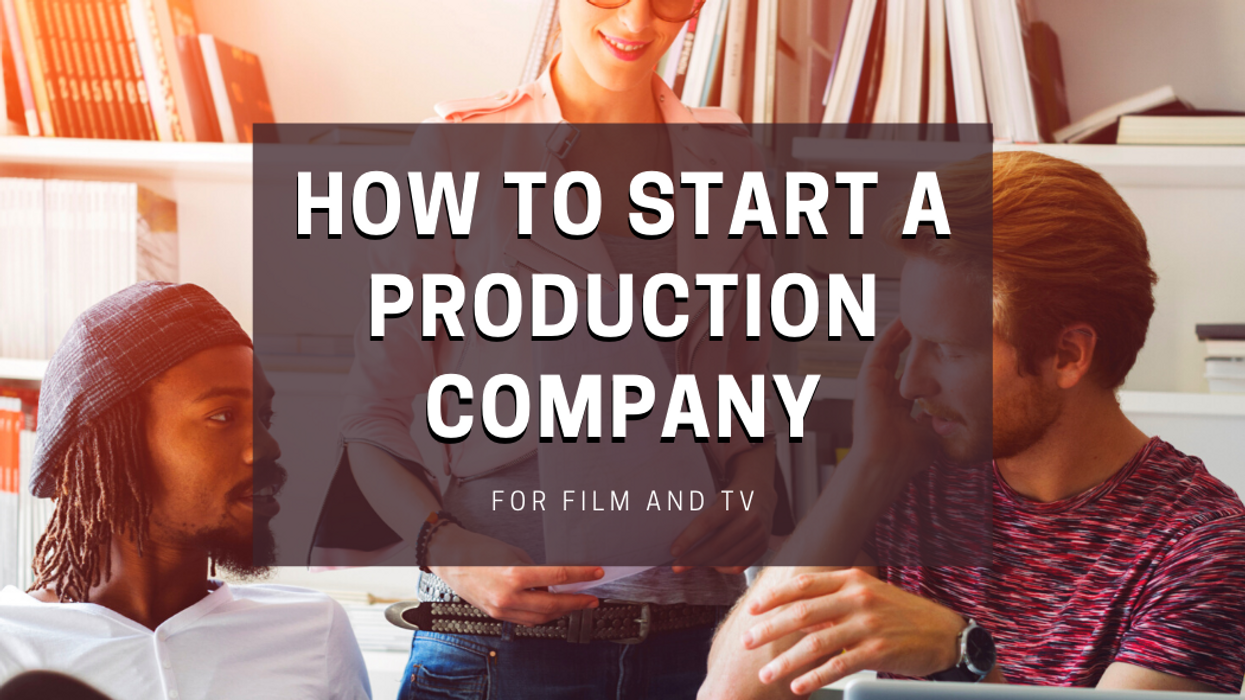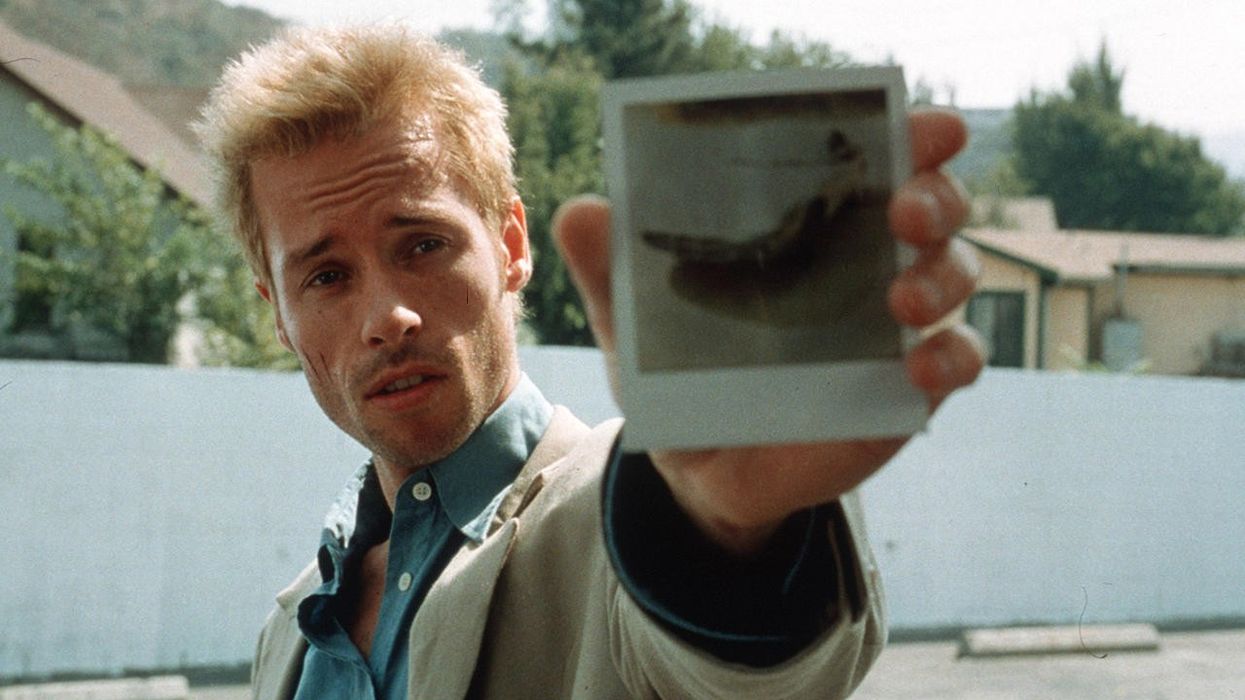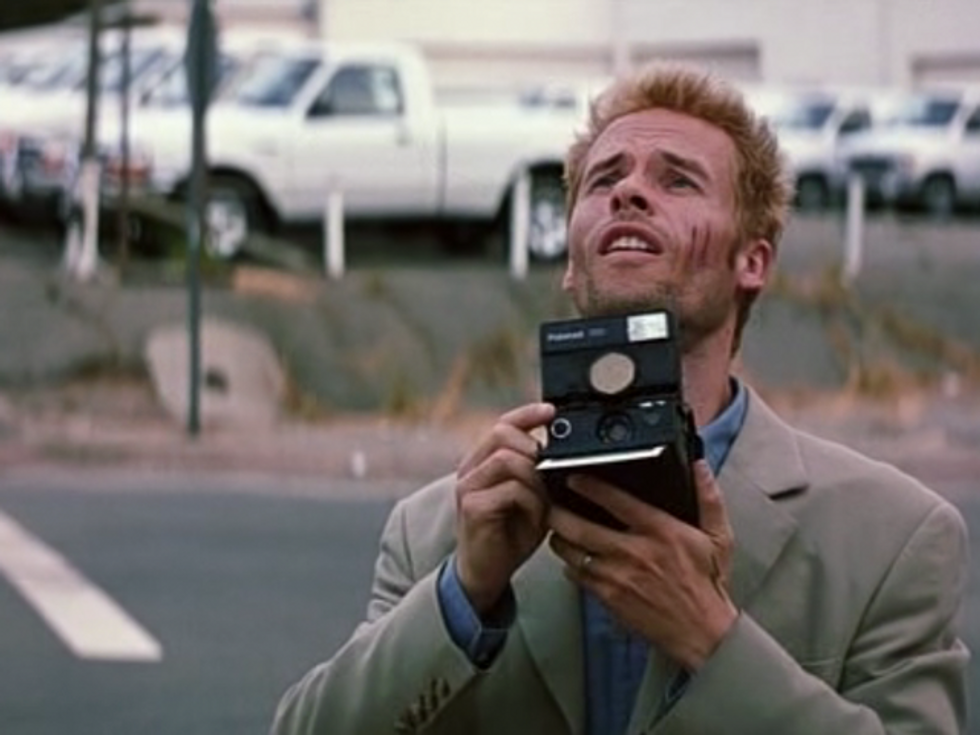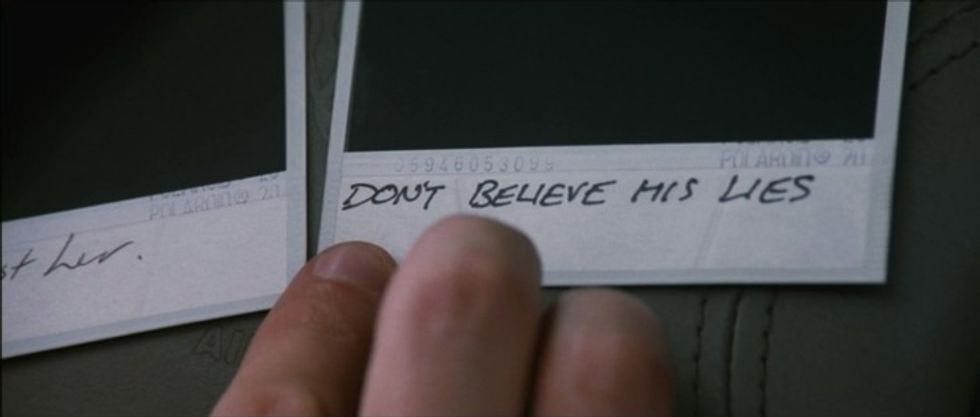How to Start a Video Production Company
Many of us dream of having our own production company. Here is how you go about it!

It's the dream of many a filmmaker to have their own production company. The goal is usually to build a media production company so you'll be able to accumulate the resources (post suites, camera, lighting, and sound gear, and best of all professional relationships) to support doing your own creative work.
This was true way back when Coppola launched American Zoetrope, and it remains true today, though of course, the landscape has changed tremendously in the last 50 years.
Right off the bat, we need to make a distinction between the type of production company we're talking about in this article and the famous production companies often attached to big-name directors, producers, and stars.
Those companies, sometimes referred to by the slang term "shingle," as in "famous star John Tomato has hung out a shingle," have some things in common with the type of production company we're going to talk about here, but there are some key differences that are worth considering.
Namely, they are run by people who are already big-name talent and have the relationships to go with it, so their cash flow plans are different. They also likely have more startup capital available to them, so they can focus more on longer-term goals and worry less about short-term cash flow.
This article is going to focus on those of us looking to build a production company from scratch as a launchpad into a film career. Starting with little to no capital and connections, how do you go about building a business so that you can get your foot in the door of telling stories with moving images for a living?
What is a production company?
There is an old joke in film that all a production company has is just blanket insurance, a line of credit, and a Rolodex. The joke basically means that if you are wondering, "What do I really need to have a production company?" Well, it's really just the paperwork—a blanket insurance policy that covers your productions in case something goes wrong, access to some money, and some connections for getting hired and for executing the work.
But a better way to think about a production company is that it is a form of guarantee.
All media creation is risky. Even major filmmakers make flops, and making any moving image is way more complicated than renovating a bathroom (though that is complicated as well). When you hire someone to make a video of any sort, you want to know they will actually be able to deliver. A production company is a way of doing that, by saying, "Look, we've done all these things in the past, if you hire us we'll do that again." It's the reason why the same production companies get hired over and over again.
So the most important aspect of creating a production company isn't just insurance, credit, and contacts, it's experience. Sample work to demonstrate, "We can do this." To create that aura of trust that allows clients to hire you.
Before we get to that, though, let's talk a bit about incorporation.
LLC. vs. S-Corp, etc.
One issue that comes up all the time is, "What form should the business take?"
"LLC or S-Corp?" is a common question in the USA, but we're a site with a large international readership, and we can't answer for every local jurisdiction. The best answer is to research the rules of your county, state, or country to see what makes the most sense for you. An accountant is always worth the money since business taxes get complicated, and your accountant will have an opinion on this issue as well.
What form you take aside, you absolutely have to incorporate to launch a production company. You want to incorporate for a host of reasons, but one of the best is so that you can get a separate bank account for the business. This allows you to keep your books clean and simple. Personal expenses come from your personal account, business expenses from the business account. Running a business through your personal account is messy and will lead to problems later.
Incorporate, open a business bank account, and away you go.
Naming & website
To incorporate, you need to name your business. You will quickly realize that the vast majority of good names are already taken. It's very hard to name a production company.
But keep looking, and you will find a good production company name eventually, one where the .com might even be available. If not, the .tv can work just as well and doesn't have the stigma that non-dotcom names had in years past.
The web URL is an essential part of the name, and it should be thought about. Your website is how clients will evaluate if they want to hire you, and you want a URL that is easy to remember and easy to send to people for evaluation. Also, while you can use sites like Squarespace and Wix to build your site, you absolutely have to pay for them to remove their branding. A production company can't have a free site with a watermark on it. You won't be taken seriously.
It is usually good to think about a name that will be flexible long term. If you dream of making narrative features but are starting with local commercials, a name like "Springfield Local Commercials" might not treat you as well in the long term.
Reel and spec work
All right, now you've got a name, you've incorporated, and you've got a bank account. How do you get work as a production company?
You absolutely need some established work to show on your website. A production company without work will have a very hard time landing more. The biggest comfort to a client is knowing that the person they are hiring to do something has done it before.
One way to get this work together is to pool resources with a group of friends. For instance, it's common for a group of film school friends to get together to form a production company. While each of them might only have one piece of work that is good enough to be considered "professional," taken as a group they likely have enough work to put together a slick presentation.

But what if you don't have anything? You have to find a way to create spec work. This means going out and shooting material that is designed specifically to help you book more paying work, but doing it out of your own personal pocket.
Here is the key to spec work: it has to be just as good as professional work. You don't get to say to a client, "Look at this thing I made for only $200, imagine what I could do if you gave me $10,000!" That isn't how it works.
Clients are wonderful, but if clients had imagination, they wouldn't be clients. They need to see work that is as good as they are looking for. If they have a $10,000 budget for a spot, they want to see work on your site that matches their quality expectations. Even if you made a $200 budget look like $5,000, if they want to see things that look like $10,000, you are out of luck.
So you have to generate spec material for your site that looks amazing, incredibly professional, dynamic, interesting, current, and slick—for no money. Or you have to acquire it, by teaming up with a group of people who have all created some work that is close.
Also, it usually needs to be a variety of work. A production company website with a single video sample isn't impressive. You need a gallery of at least six to nine things that shows off your skills and the skills of your team to really get cooking. And you'll have to spec it.
The same thing is true if you are set up now to make longer-form content, but the payoff is longer term. You'll need to develop several projects that are ready to go, and you'll need some work you've created to demonstrate skill and craft. However, with longer-form content, it can take years to make any money, so many start with short-form to get cash flowing before focusing on long-form.
Niches
One thing that is helpful when thinking about the work for building up your company is identifying your niche. Like it or not, most careers thrive in one niche, and most filmmakers are constantly trying to break out of their current niche to enter another niche.
Corporate filmmakers trying to make more commercials, commercial filmmakers trying to make features, feature filmmakers known for horror trying to do action, or known for action trying to do comedy, car DPs trying to break into lifestyle... This is never going to end in your career, and you'll need to keep pursuing the next step to stay excited about the industry.
First, though, you need to start somewhere.
We end up in niches because clients want to see precisely what they are hiring you to do on your reel. A friend of mine with a career in pet commercials, which is a very real niche with a variety of clients between pet stores, pet food, pet toys, and more, likes to joke about the niches within niches.
"I'm good with the big dogs, labs, retrievers, malamutes, but when a job comes through for a little dog, they won't even look at me cause I don't have little dogs on my reel."
He's kidding, but only a little bit.
So pick a niche and build your spec work around it. If you are going to take the time to shoot spec material, it will serve you better to make three amazing, beautiful spec spots that are in the same niche (though different enough from each other to show variety. You can't just shoot one thing and cut it three ways) than to create three pieces that are wildly different from each other.
A music video, a commercial, and a sports doc are too spread out, but three sports docs on different subjects and in different styles can work.
A client over lunch once said to me, "I like to know what I should call each company for. What should I call you for?"
You want to be able to answer, and then support that answer with work.
It's a good idea to pick a niche you are passionate about and have a lot of interest in and knowledge of. Into sports? Do some sports specs. Into music? Music video specs. Into cars? A few car specs, which can be done inexpensively if you team up with a local enthusiast club. Give yourself a niche, and you get a foot in the door. You can break out of that niche later.
Do some research about your niche to be sure there is actually going to be work there.
For some reason over and over filmmakers decide they want to get their start making videos for local restaurants and small businesses.
The problem is that most local restaurants and small businesses don't advertise, or if they do, they use platforms that are text- and image-based, not video. A video really does nothing for them, and so they aren't likely to pay for videos to get created. If they are, they are only going to pay a small amount, generally too small to be worth doing if you are trying to build a business.
Generally speaking, if no one is already currently doing it, it's not a business. If a few people are making a living at something, there might be room for a few more.
Cash flow vs. ambition
It's also helpful to think about cash flow vs. ambition. As discussed above, most creatives are in a niche trying to break out.
How do you break out?
By continuing throughout your career to either do spec work or to over-deliver on client work such that it becomes spec work. If you want to eventually produce features and television, you are going to need to keep making sure you produce a narrative something every year—a short, an indie feature, etc. You are still going to need some other income between those projects.
You are going to need cash to survive. You have to eat. There is no shame in that, so you want to make money doing this.
The issue is that as a creative, we also desperately want every single thing we do to be as good as possible. Thus what often happens is you are given a budget for something too small for your ambition, and you end up sacrificing your own pay, or even putting in your own money, to make something better than the client is willing to pay for.
On a $50K job, you should expect to be able to pay the producer 10% and the director 10%, roughly $5K each.
Let's say you decide to produce yourself, and you have ambitions to do something more like $100K in quality and content for the $50K. You call in favors from friends to come in at lower rates, you give that $5K for producing to the budget, and you still need more. So you decide to give up your $5K directing fee as well, because you love the idea so much.
Then you need more money, so you find another $2K of your own money that you made on the last job, and you put that in as well, because you want a better location. It happens all the time, because as a creative you want everything you do to be everything it can be.
On bigger jobs, you can ask clients to pay for the overages, but as you are climbing the ladder, sometimes you eat the costs yourself.
This is wild. It would never happen in another business. Your lawyer is never going to pay extra of their own money for a court case because they want it to be good if you don't have the budget. But creatives do it all the time. They are so used to paying for their own film school projects, and they are so used to not making much money, and more than everything else, they just want to make good things, that they invest their own favors, skills, equipment, and even cold hard cash into projects for clients.
Honestly, you can do it sometimes. It's OK to help level up. Because when the job is done, now you have something amazing that looks bigger than it was, and maybe that is worth it for gaining the next client. But there are two big things to remember.
First, you rarely level up the client you over-invest in. A client that gets $100K worth of quality for $50K isn't going to come back with $100K next time. If they come back, they'll come back with $50K again expecting $100K in quality. You are doing that ambitious job to get another client. It's rare you level up that first client. Often you lose them when they come back with $50K and you give them a $50K spot.
Secondly, remember, you still need to eat, and there is no shame in that. You need to make money somewhere. If it's not on your ambition projects, your high-end spec spots, or your short films or indie features, you need to find money to survive, or you will just give up and leave.
This means it's often helpful to divide up your work into "ambition" projects and "cash flow" projects. On cash flow projects, you need to pay yourself properly to live while making the project.
For many production companies, the cash flow projects are actually in another field entirely. It's not uncommon to see a production company that makes most of its cash flow money in post-production or VFX. Or a media company that has a business outside of production like Google Adwords optimization and SEO consulting, to keep cash flowing and mouths fed, so that they can afford to not make money on production or even lose a little money on production.
This is especially vital since production income is so irregular.
You might book three things in a month, then nothing for four months. It's the nature of production. But if you have a regular cash flow business bringing income week in and week out, it's easier. For many the first few years of their production company are a side hustle while they work their day job, slowly building up relationships and a reel until they are working enough that they can let that cash flow go.
Finding clients
Where do you find clients? Everywhere, really, but the key is to stay in the game as much as possible to keep meeting the people you need to meet.
Your first clients are likely to come through word of mouth from friends or acquaintances. The budget will be low, but someone will hear you are making things and have a thing they want made.
You can also pursue clients on online platforms and enter contests. These are actually a surprisingly useful way to get practice writing pitches and treatments, and can occasionally lead to people building up work resumes. There is a variety, and we can't list them all here, but the Doritos SuperBowl competition is one of the most famous. Even outside of that, major brands are hosting commercial contests all the time.
Spec work often leads to building relationships that lead to your first paying client. For instance, if you decide you want to launch in sports, you should get in touch with local sports organizations and shoot them for your spec work. Hiring all the actors and dressing them for a sports spot is expensive, but working with the local little league to get them to appear in a spec spot is much easier.
Once you make those specs and show them to the people in them, that can often lead to your first initial paid gigs. The same is true with music. If you find several local bands you like and make them free videos, that can lead to people seeing them and asking to collaborate. Bands have friends with other bands and will follow each other on the social platforms and that can lead to good word-of-mouth if you deliver good work.
The important thing is to keep yourself in the mix. Keep making things and following up with people when you make things, and get your content out there.
Some have experimented with Google search ads, but the results haven't been amazing. The issue is the budget involved. Most people who go to Google and search for "video production company" don't tend to have the budget to spend that makes the work worth it. They want to spend hundreds of dollars on a video.
You'll need to graduate to people spending tens of thousands to hundreds of thousands, and those clients don't usually Google "production company."
Another great way to start is to work for someone else for a few years in your chosen niche before starting on your own. This will generally lead to getting to know all of the relevant parties in a field. If you want to work in music videos, by interning or assisting at a music video house you can get to know how it operates, but also get to know the key crew they use and maybe even meet a few young clients. You might not be able to poach their A-list clients (nor should you if you want to keep the relationship with the production company), but you might meet smaller clients where you could forge a relationship of your own.
You can also try cold emailing. It doesn't work often, but sometimes it will lead to something. If you identify a niche you want to work in, you can email the marketing departments at companies in the space and try to forge relationships. Most cold emails are ignored, but if you send out 1,000 emails and get two responses, that is still two possible connections worth making.
Getting press once you have done work is also vital to getting more work. After the first video I produced in a specific niche, we got two articles written about it in trade publications catering to that market, which led to a few cold emails coming in to us from potential clients who had seen the articles. But of course, this only works once you have created work that has done well.
Acquiring gear, buy vs. lease
One thing many production companies want to do is acquire gear. This is a reasonable thought, since if you are shooting often you are likely paying so much in rentals that it could save you money to purchase some gear yourself.
The biggest mistakes people make in this area are forgetting to budget for maintenance (all gear needs support), and thinking they'll have longer to pay it off than is realistic. A camera usually is "hot" for two to three years at most, so be sure to plan to need another camera in two to three years.
Research long-term leases of gear before paying outright. With a $50K camera package, even if you have that much in the bank, you ideally want to keep it in the bank to cover a rainy day. You might be able to get a business equipment lease to acquire the gear and pay only $2,000 per month to have the gear on hand, letting you keep cash in the bank. Equipment leases, since they are secured, generally offer very low interest, and can be set up to allow for a $1 buyout at the end of the lease to keep the equipment.
Never, ever purchase equipment with a credit card. The interest rates on credit cards are murderous, and since it's equipment, it can be leased at much better rates.
Conclusion
A media production company can be a great platform for growing your career. It will introduce you to clients and collaborators, help you grow your skills and level up your reel, and can be a valuable part of making a living making movies.
You will have to learn some business and bookkeeping skills, and you'll have to navigate complicated negotiation waters, but all of these skills will benefit you in countless ways on your creative journey.
Have you ever started your own company? Share your tips in the comments!






 'Memento'Credit: 20th Century Fox
'Memento'Credit: 20th Century Fox 'Memento'Credit: 20th Century Fox
'Memento'Credit: 20th Century Fox Credit: Wikipedia Commons
Credit: Wikipedia Commons 'Memento'Credit: 20th Century Fox
'Memento'Credit: 20th Century Fox









